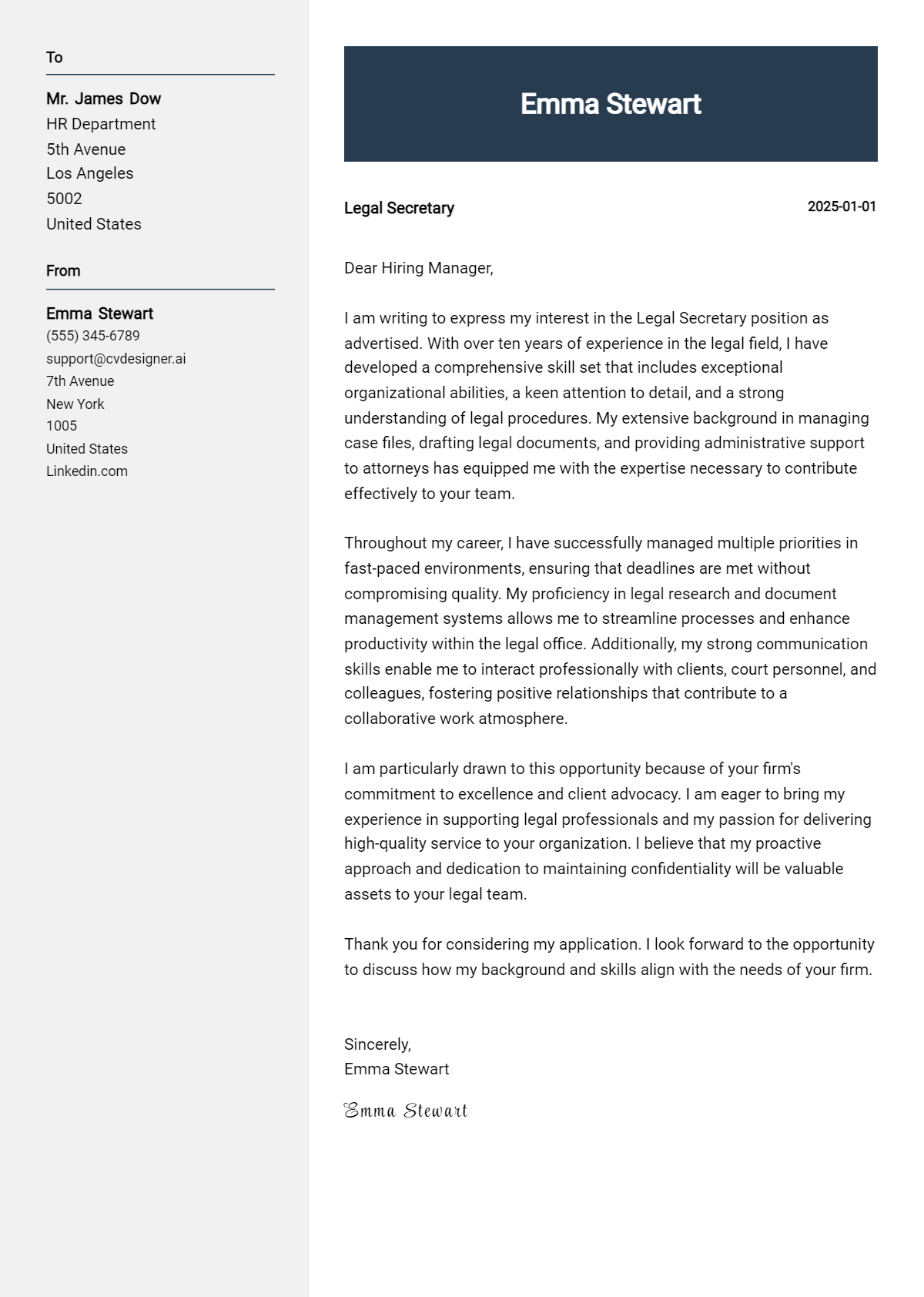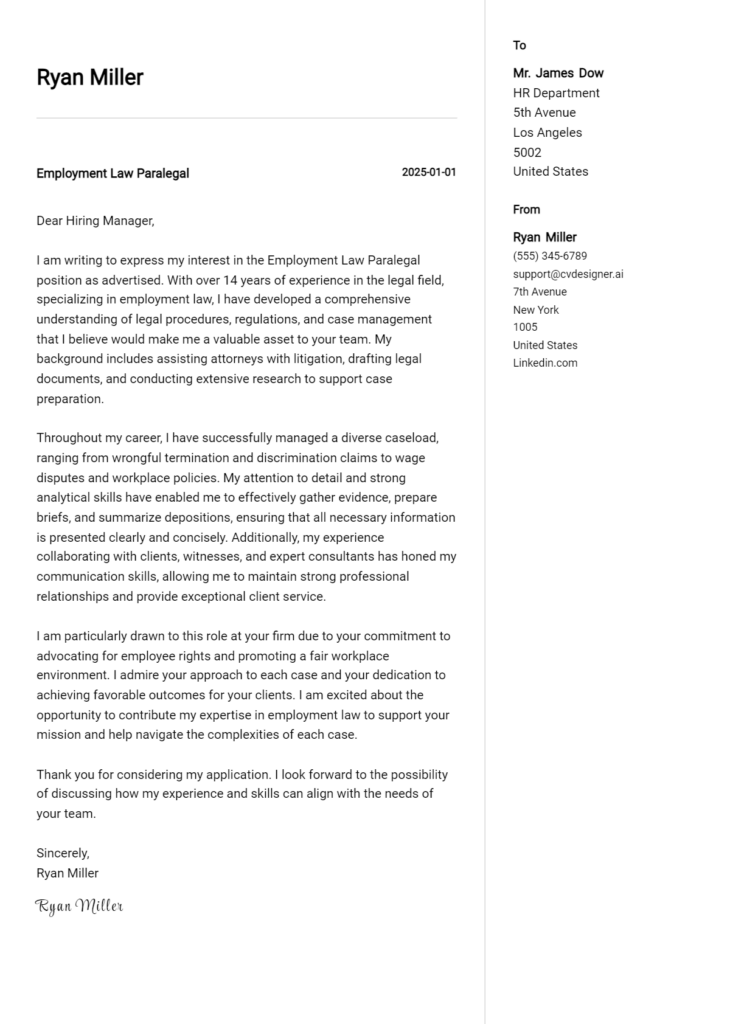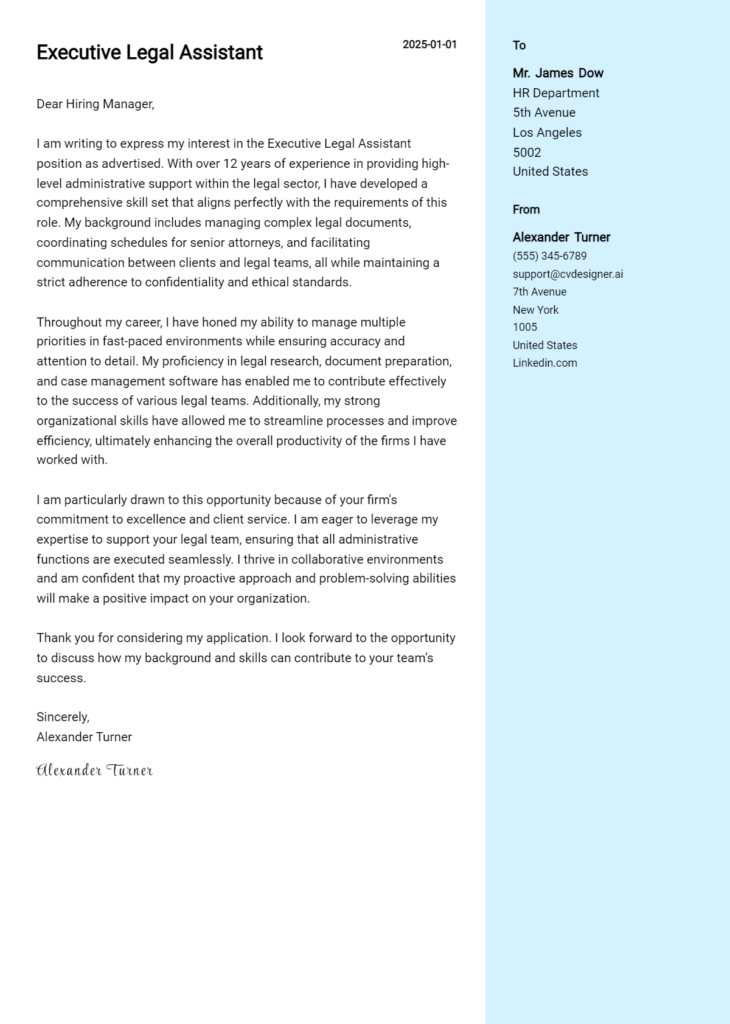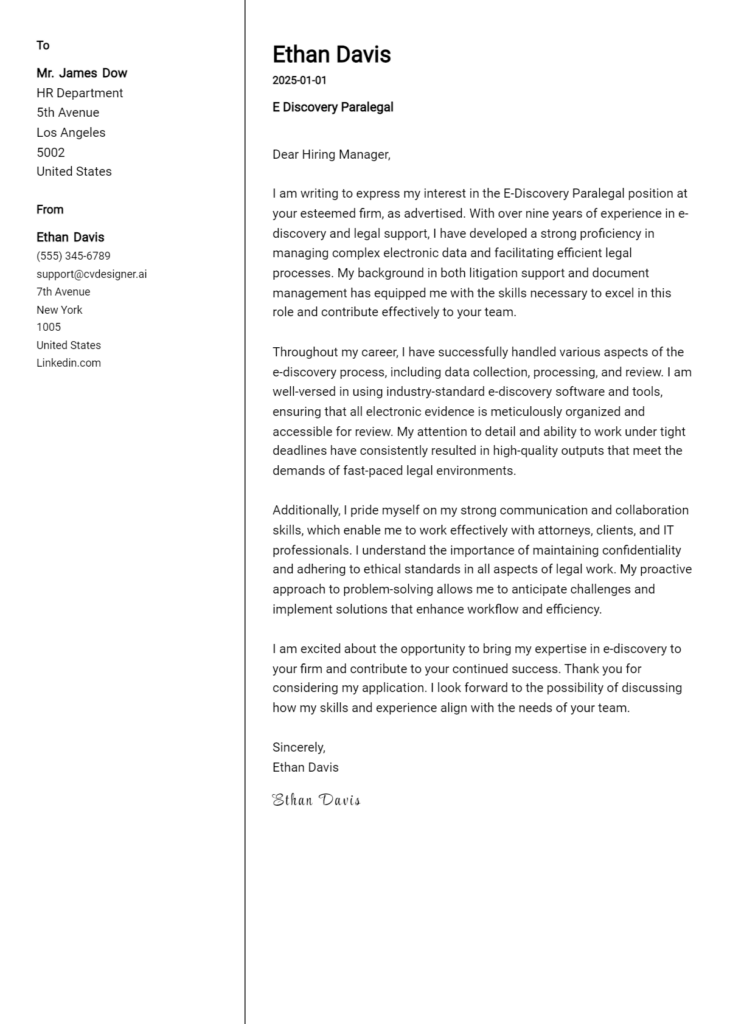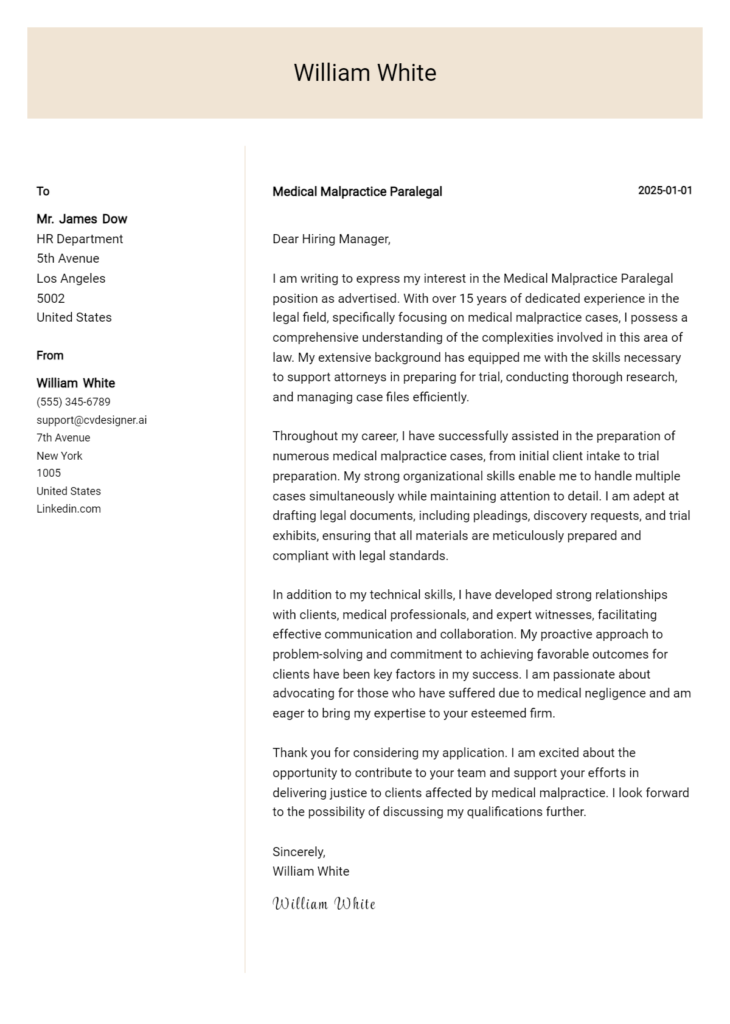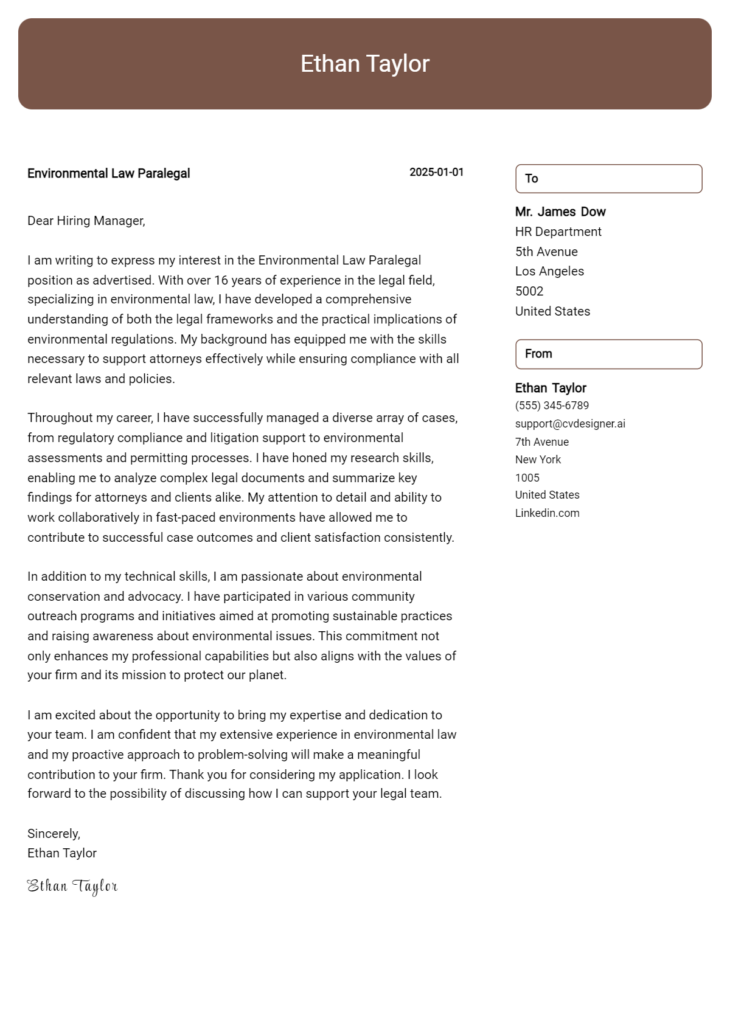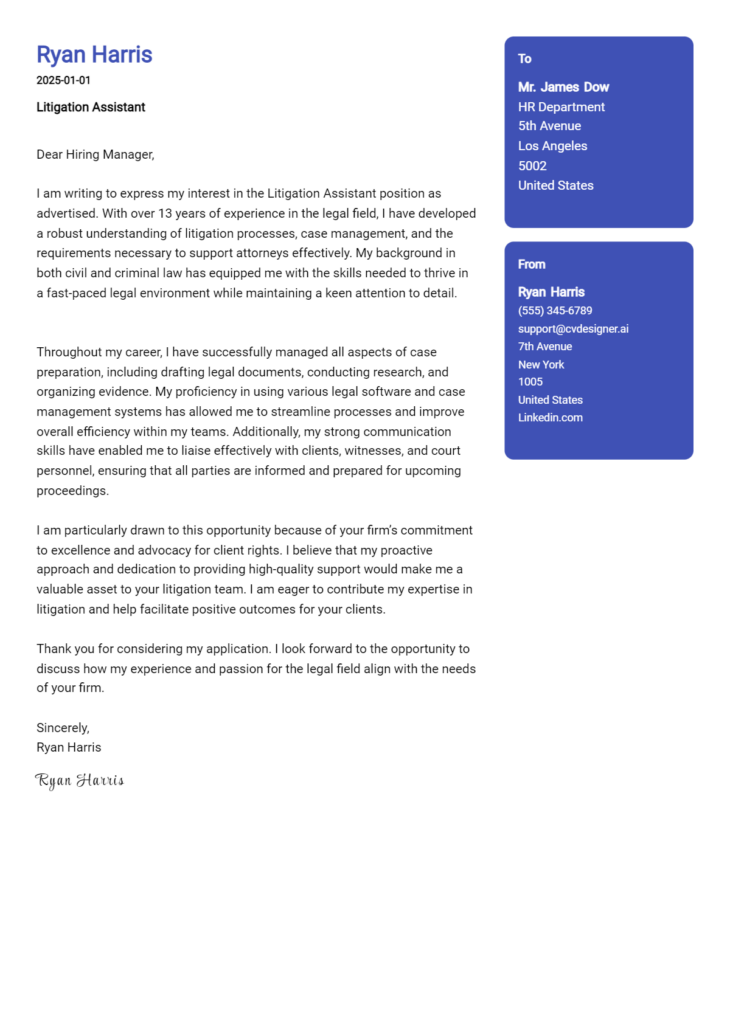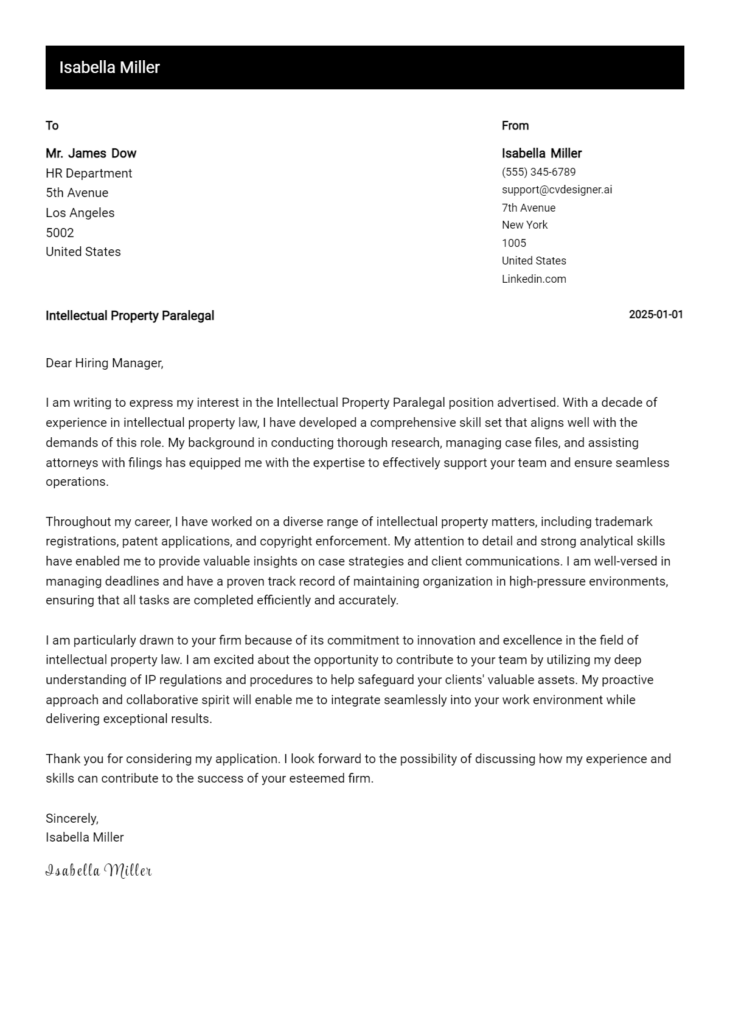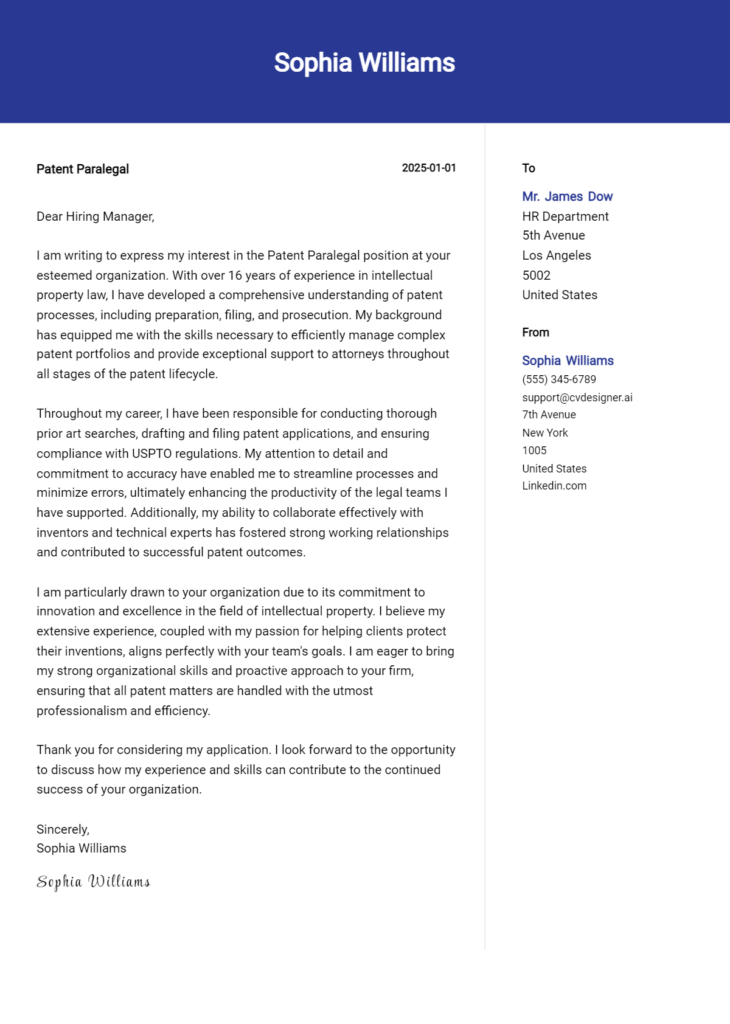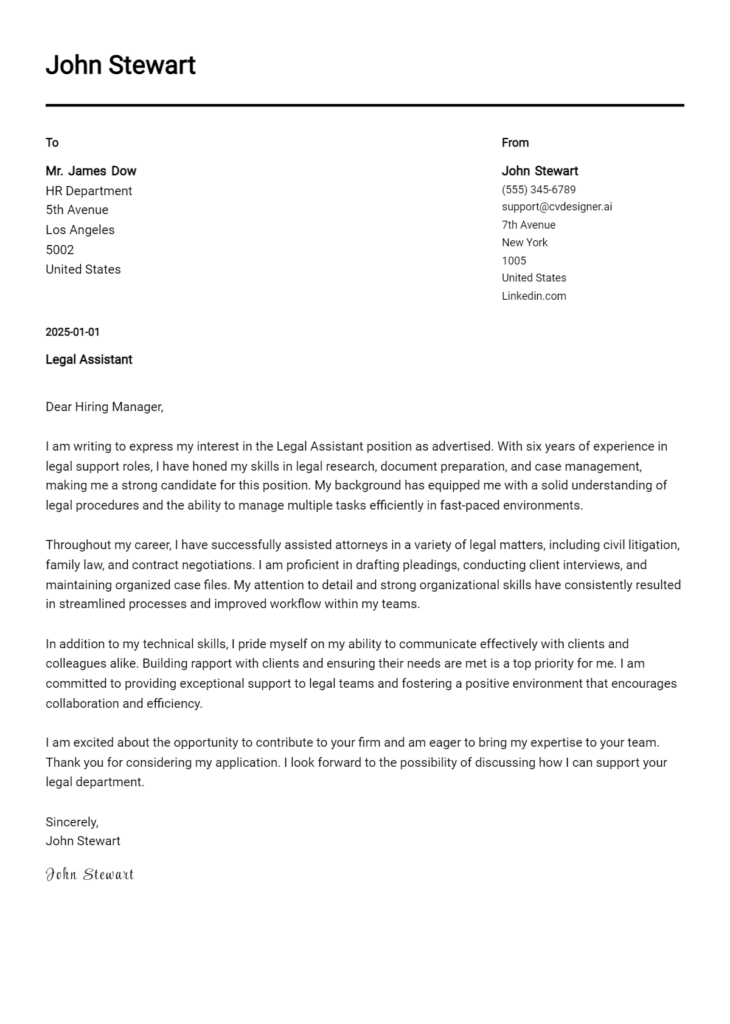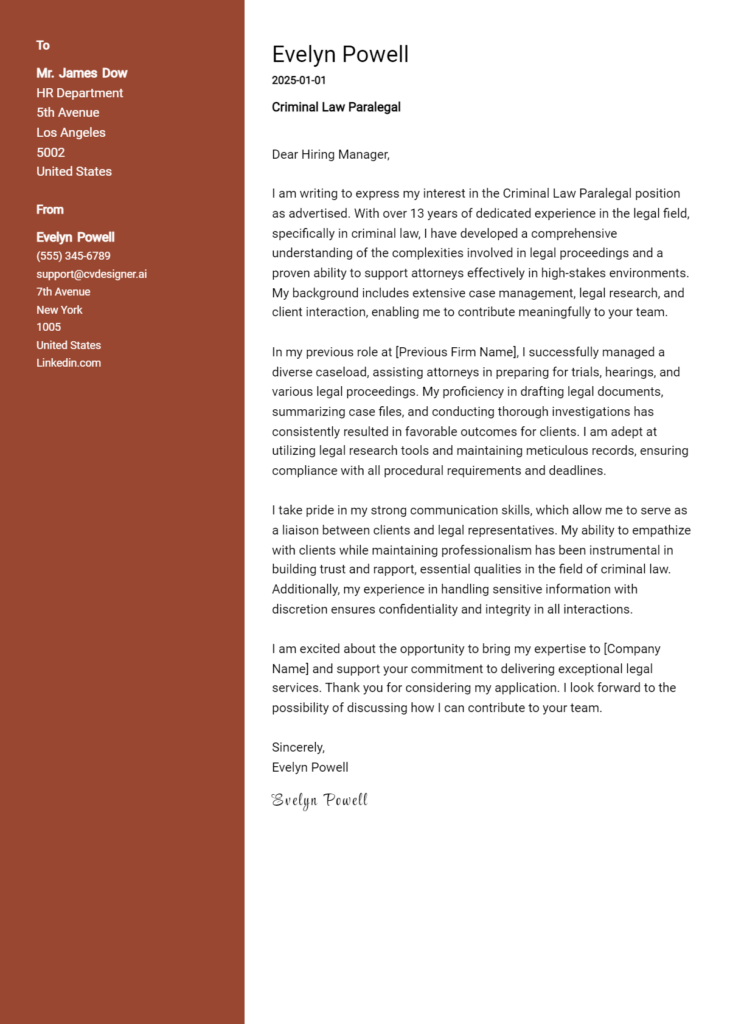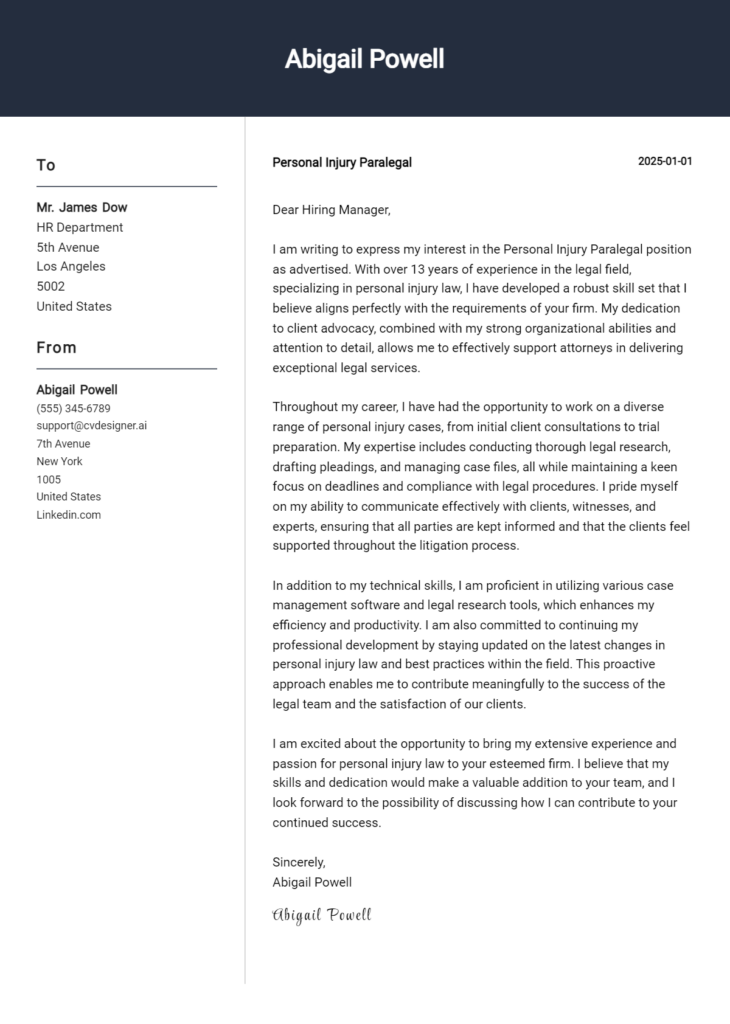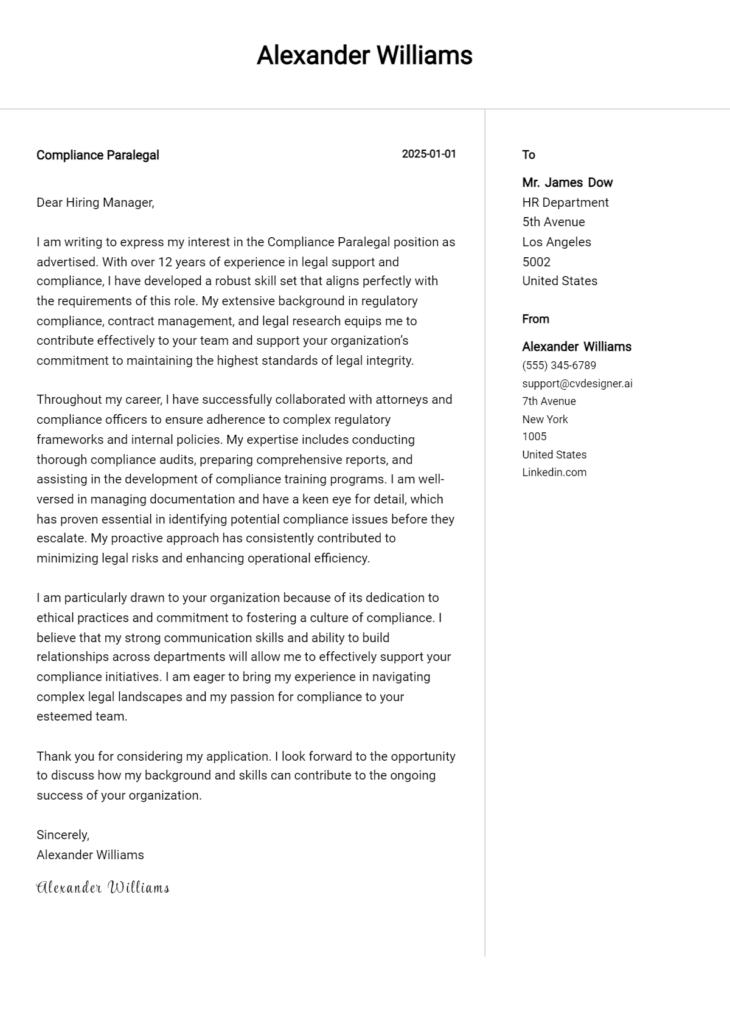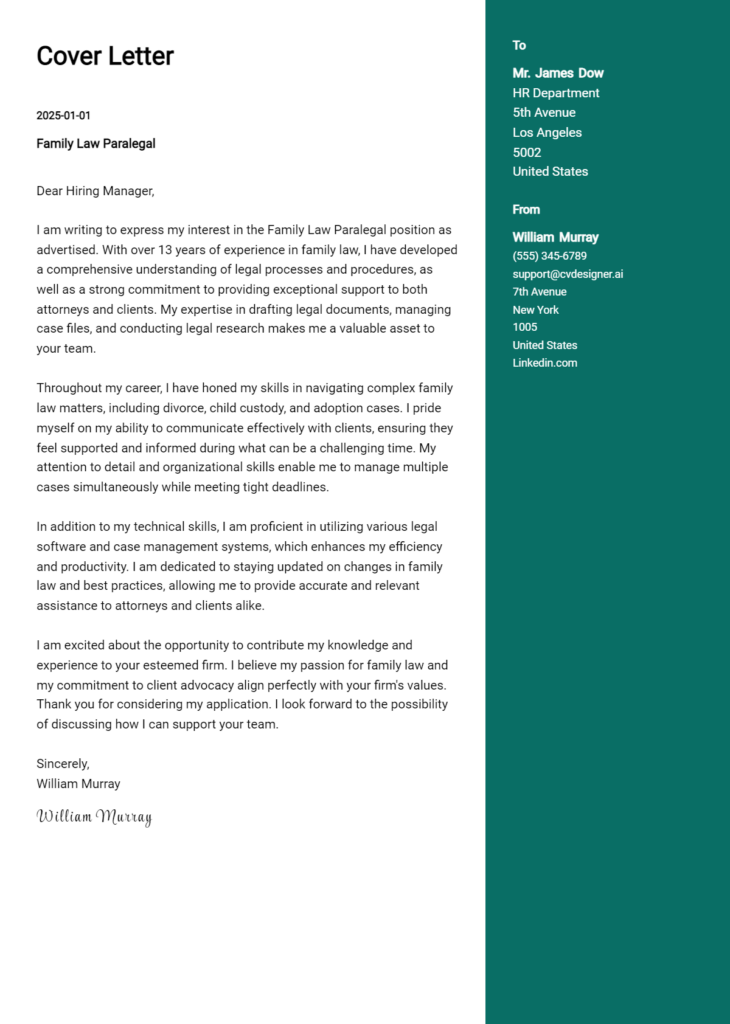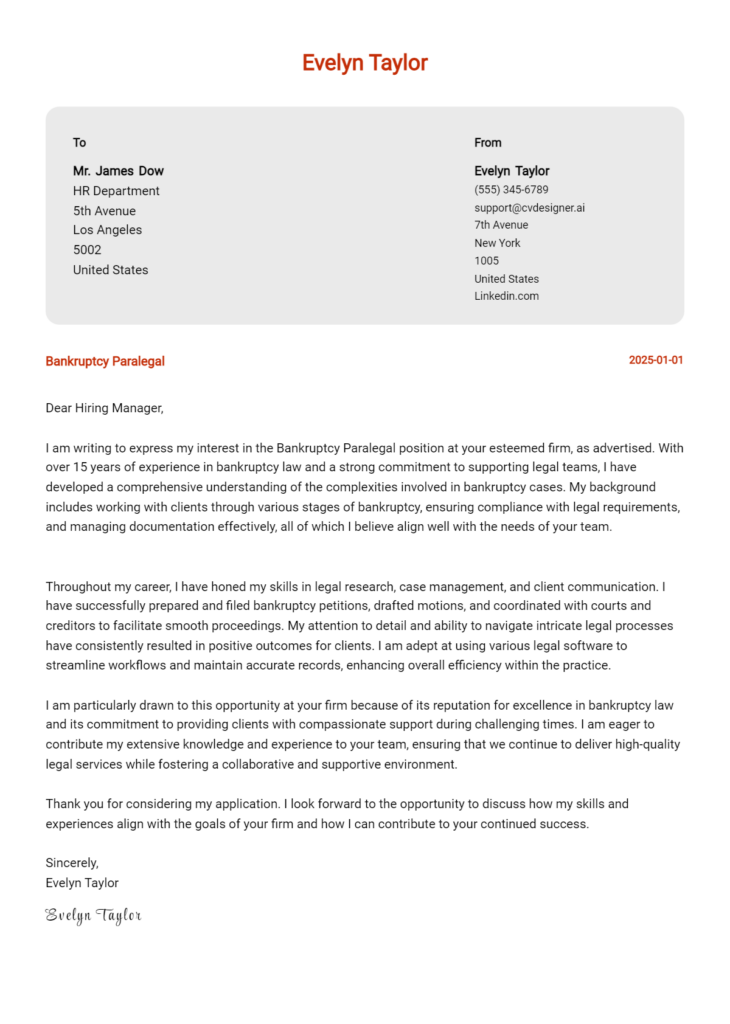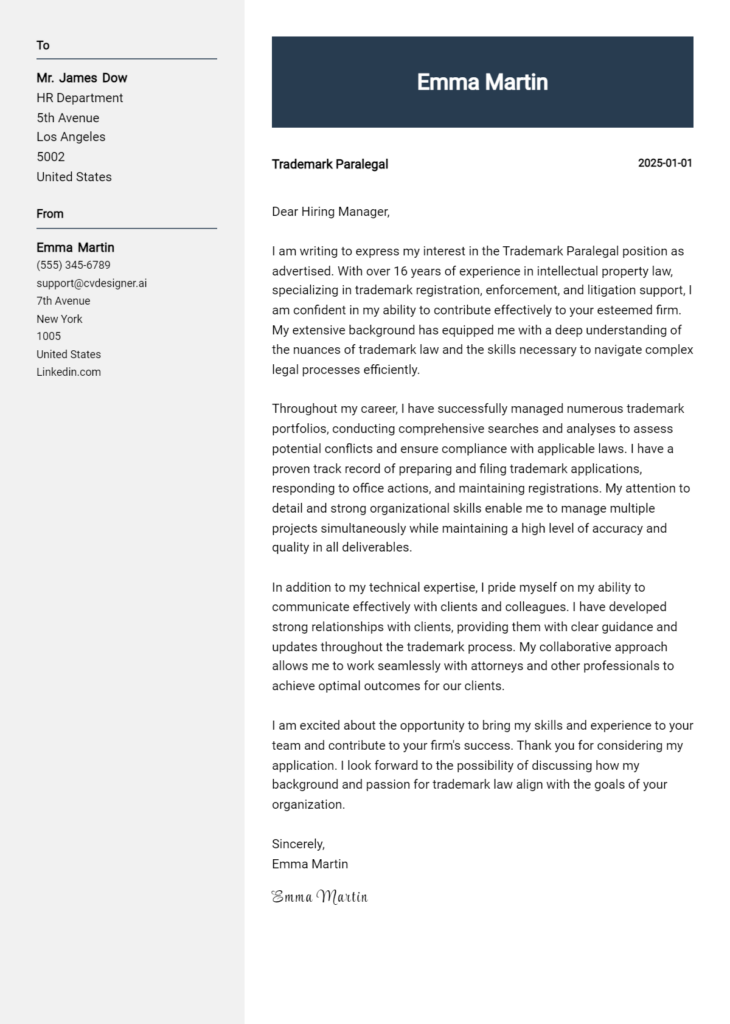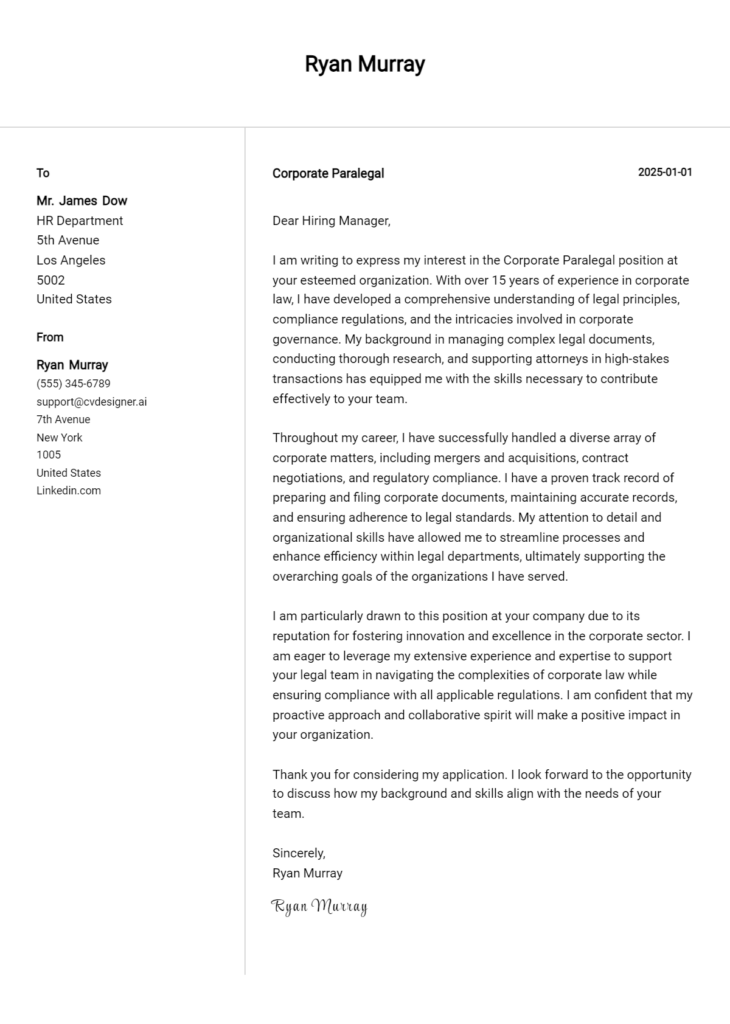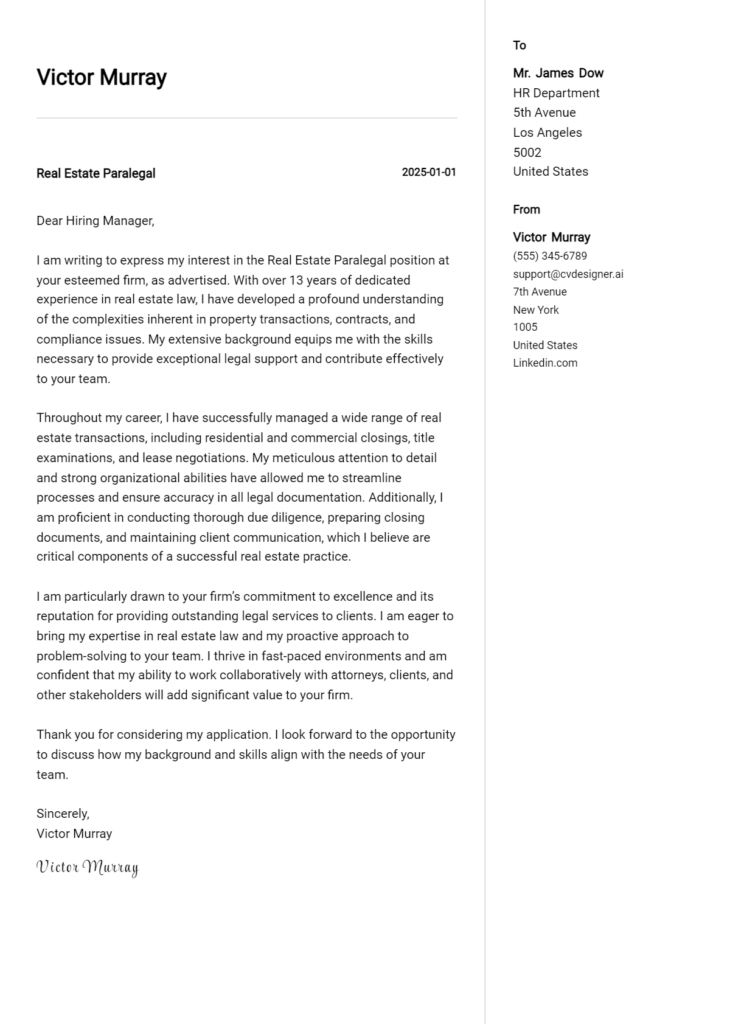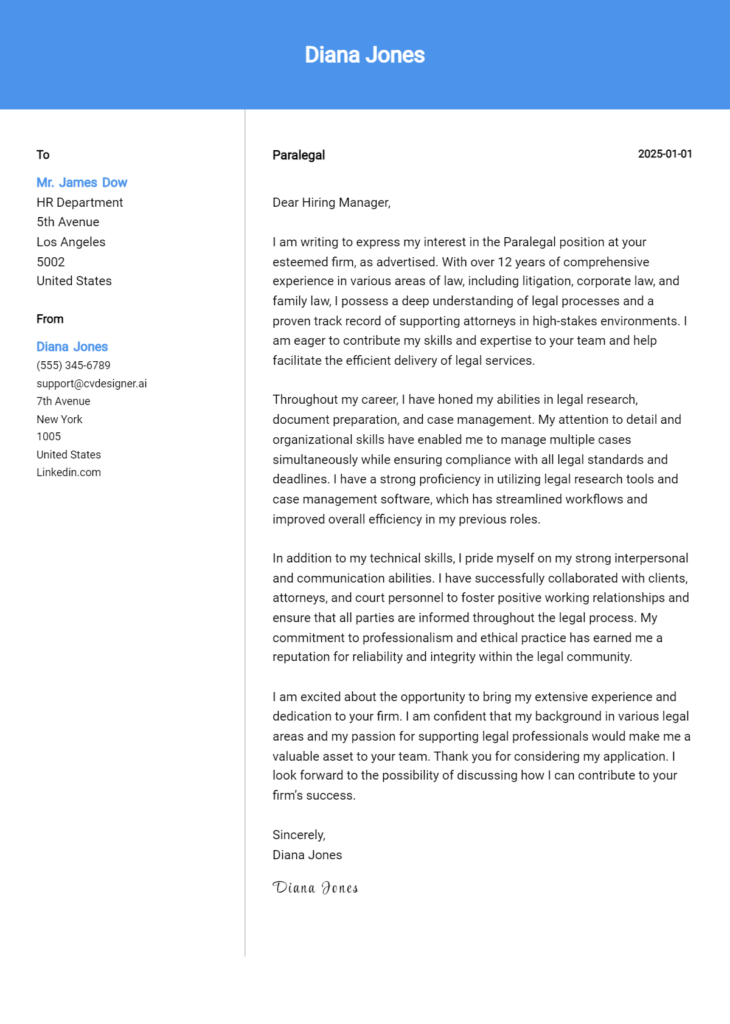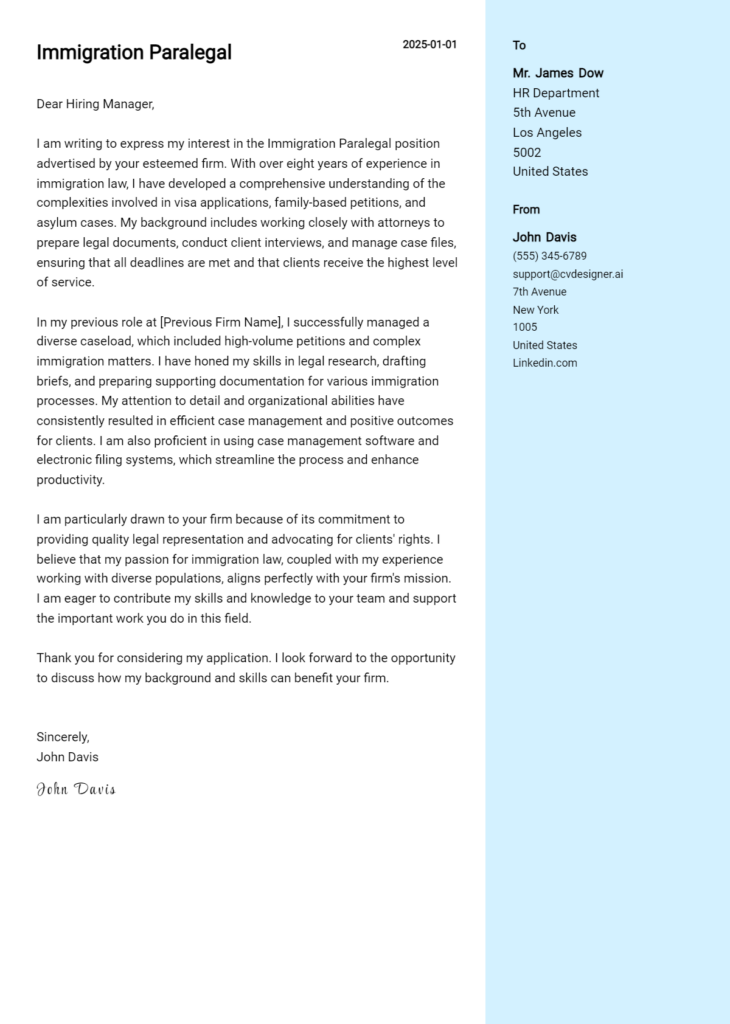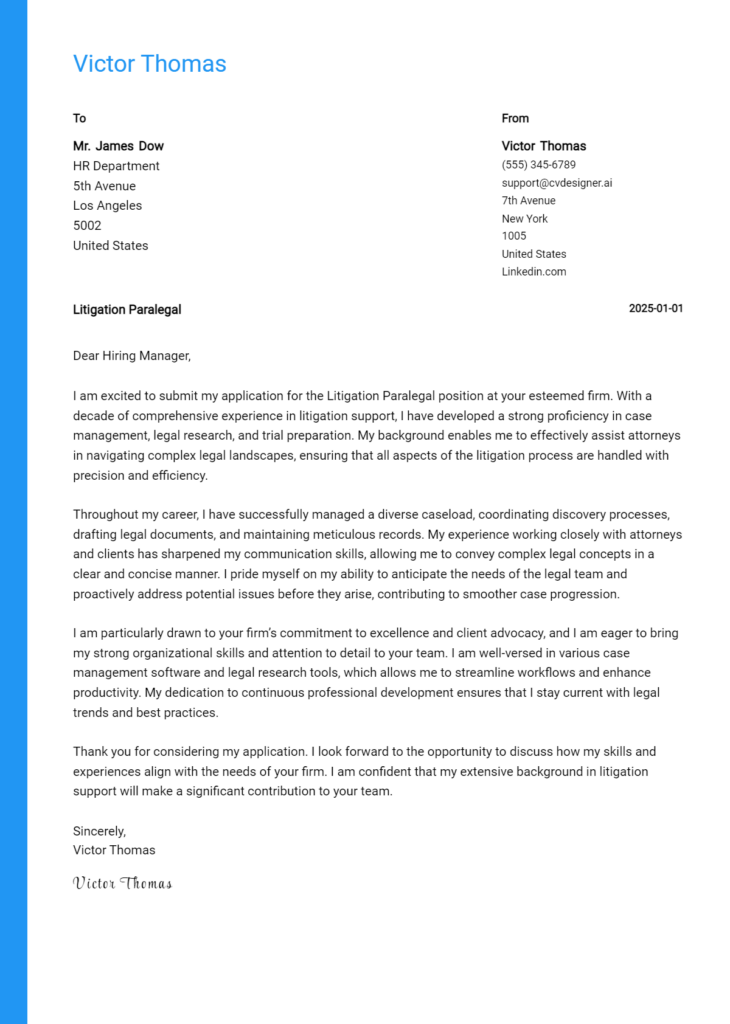Legal Secretary Cover Letter Examples
Explore additional Legal Secretary cover letter samples and guides and see what works for your level of experience or role.
How to Format a Legal Secretary Cover Letter?
Crafting a well-structured cover letter is essential for a Legal Secretary, as it serves as your first impression on potential employers. The format not only conveys your qualifications but also reflects your organizational skills and attention to detail—critical attributes in the legal field. A professionally formatted cover letter helps you stand out by capturing the hiring manager's interest while demonstrating your ability to communicate effectively.
In this guide, we'll explore how to structure your Legal Secretary cover letter, providing practical insights and relevant examples to help you develop a persuasive document.
We will focus on the key components of a professional cover letter, including:
- Cover Letter Header
- Cover Letter Greeting
- Cover Letter Introduction
- Cover Letter Body
- Cover Letter Closing
Each section is crucial for showcasing your legal expertise and professionalism. Let’s delve into each part to ensure your Legal Secretary cover letter makes a strong impact.
Importance of the Cover Letter Header for a Legal Secretary
The cover letter header is a crucial element for a Legal Secretary, as it serves as the first point of contact between the applicant and the potential employer. A well-structured header conveys professionalism and attention to detail, attributes that are essential in the legal field. The header should include the applicant's contact information, the date, and the recipient's details, ensuring that all parties can easily identify and communicate with one another. Clarity in layout and format is paramount, as it reflects the applicant's organizational skills and ability to present information effectively.
Strong Example
Jane Doe 123 Legal Lane Cityville, ST 12345 jane.doe@email.com (123) 456-7890 October 1, 2023 Mr. John Smith Hiring Manager Law Firm Name 456 Justice Blvd Cityville, ST 12345
Weak Example
jane doe cityville, st jdoe@email 10/1/23 law firm
The Importance of the Cover Letter Greeting
The greeting of a cover letter is crucial as it sets the tone for the entire document and establishes a professional rapport with the hiring manager. A well-crafted greeting not only shows your attention to detail but also reflects your respect for the person reviewing your application. By addressing the hiring manager directly, you personalize your letter, making it clear that you have taken the time to research the company and its staff. To avoid generic greetings like "To Whom It May Concern," which can come off as impersonal, it is advisable to find out the name of the person responsible for hiring. This effort demonstrates initiative and a genuine interest in the position.
Strong Greeting Example
Dear Ms. Johnson,
Weak Greeting Example
To Whom It May Concern,
The Importance of a Strong Cover Letter Introduction for a Legal Secretary
A well-crafted cover letter introduction is crucial for a Legal Secretary position, as it serves as the first impression for the hiring manager. This opening paragraph should not only capture the reader's attention but also convey the candidate's genuine interest in the role. By briefly showcasing relevant skills or notable achievements, the candidate can set the tone for the rest of the letter and demonstrate their qualifications effectively. A strong introduction can distinguish a candidate in a competitive job market, while a weak one may lead to missed opportunities.
Strong Example
Dear [Hiring Manager's Name], I am excited to apply for the Legal Secretary position at [Company Name], as advertised on [Job Board/Company Website]. With over five years of experience in providing comprehensive administrative support within a fast-paced legal environment, I have honed my skills in document preparation, case management, and client communication. My attention to detail and ability to manage multiple priorities simultaneously make me a perfect fit for your team and the high standards you uphold at [Company Name].
Weak Example
To Whom It May Concern, I am writing to apply for the Legal Secretary job. I have some experience in administration and think I could do this job. I am interested in working at your firm because it seems like a nice place to work, and I need a job.
Purpose of the Cover Letter Body for a Legal Secretary
The body of a cover letter for a Legal Secretary serves as a critical platform for candidates to articulate their qualifications and demonstrate how their skills align with the needs of the hiring firm. It provides an opportunity to highlight specific experiences, such as managing intricate case files, coordinating legal documentation, or supporting attorneys in high-stakes cases, effectively showcasing the candidate's value. By focusing on tangible accomplishments, such as successfully implementing a new filing system that improved efficiency by 30%, candidates can illustrate their contributions to previous employers and how they can bring similar benefits to the prospective law firm.
Strong Example
In my previous role at Smith & Associates, I successfully managed the preparation and filing of over 200 legal documents for a major class-action lawsuit, ensuring compliance with strict deadlines and regulatory requirements. By implementing a new digital tracking system, I improved our document retrieval time by 40%, which significantly enhanced our team's productivity. My proactive communication with clients and court personnel fostered strong relationships and ensured that all parties were informed and prepared throughout the litigation process. I am excited about the opportunity to bring my strong organizational skills and attention to detail to your firm, contributing to the success of your legal team.
Weak Example
I have worked as a Legal Secretary for a few years. I am good at typing and filing papers. I can answer phones and do basic office tasks. I think I would be a good fit for your company because I need a job and I want to work in a law office.
Importance of the Cover Letter Closing for a Legal Secretary
The closing paragraph of a cover letter for a Legal Secretary position serves as a critical opportunity to summarize your qualifications, reaffirm your enthusiasm for the role, and guide the reader towards the next steps, such as reviewing your resume or scheduling an interview. A strong closing leaves a lasting impression, reinforcing why you are the ideal candidate, while a weak closing may miss the chance to confidently assert your value.
Strong Example
Thank you for considering my application for the Legal Secretary position. With my extensive experience in legal documentation, attention to detail, and strong organizational skills, I am excited about the opportunity to contribute to your esteemed firm. I look forward to the possibility of discussing how my background and abilities align with your needs. Please feel free to review my resume, and I hope to schedule an interview soon to further explore how I can support your team.
Weak Example
I appreciate your time in looking at my application. I have some experience as a Legal Secretary, and I think it could be okay for the job. If you want to talk further, just let me know. Thanks.
Common Mistakes to Avoid in a Legal Secretary Cover Letter
Crafting an effective cover letter is essential for standing out in the competitive legal field. Avoiding common mistakes can significantly enhance your chances of landing an interview. Here are some pitfalls to watch out for when writing a cover letter for a Legal Secretary position:
Generic Greetings: Using a vague salutation like "To Whom It May Concern" can make your application seem impersonal. Instead, research the hiring manager's name and address them directly.
Lack of Specificity: Failing to tailor your cover letter to the specific job or firm can signal a lack of interest. Be sure to mention the firm's name and explain why you are a good fit for their particular needs.
Repetition of the Resume: Your cover letter should complement your resume, not simply restate it. Highlight your most relevant experiences and skills, providing context about how they relate to the position.
Overly Formal Language: While professionalism is key, overly formal language can make your letter sound stiff. Aim for a conversational tone that still conveys your qualifications clearly.
Ignoring Formatting: A cluttered or improperly formatted cover letter can distract from your message. Use a clean, professional layout that follows a proper cover letter format to ensure readability.
Neglecting Proofreading: Spelling and grammatical errors can undermine your professionalism. Always proofread your letter carefully or ask someone else to review it before submission.
Lack of Enthusiasm: Failing to convey your passion for the legal field can make your application forgettable. Use your cover letter to express your enthusiasm for the role and the organization.
By steering clear of these common mistakes and considering effective cover letter examples, you can create a compelling and polished cover letter that grabs the attention of potential employers.
Cover Letter FAQs for Legal Secretary
What should I include in my cover letter for a Legal Secretary position?
When crafting your cover letter for a Legal Secretary role, include your contact information, the date, and the employer's details at the top. Start with a professional salutation. Clearly state the position you are applying for and where you found the listing. Highlight your relevant skills, such as proficiency in legal terminology, document preparation, and organizational abilities. Include specific examples of your experience in previous roles, particularly those that demonstrate your capability to manage case files, assist attorneys, and maintain confidentiality. Finally, express enthusiasm for the position and the firm, and conclude with a strong closing statement that invites further discussion.
How do I tailor my cover letter for a specific law firm?
Tailoring your cover letter for a specific law firm requires research and attention to detail. Start by learning about the firm’s practice areas, values, and culture. Reference specific cases or achievements of the firm that resonate with you and explain why they are important. Use keywords from the job description to align your skills and experiences with the firm’s needs. Mention any connections you have to the firm, such as referrals or networking contacts. This personalized approach shows your genuine interest and can set you apart from other candidates. Always ensure your tone matches the firm’s culture, whether it’s formal or more relaxed.
How can I demonstrate my legal knowledge in the cover letter?
To demonstrate your legal knowledge in your cover letter, incorporate legal terminology and concepts relevant to the position. For example, mention your familiarity with legal documents such as briefs, contracts, and pleadings. You can also highlight your understanding of legal procedures and office management within a law firm context. If you have specific training or certifications, such as paralegal studies or legal assistant courses, be sure to mention them. Providing examples of how you’ve applied your legal knowledge in past roles can further illustrate your capabilities. This not only showcases your qualifications but also your commitment to the legal profession.
Should I address any gaps in my experience in the cover letter?
Yes, addressing gaps in your experience can be a strategic move in your cover letter, but do so carefully. If you have a gap due to personal reasons or a career shift, briefly explain it without going into too much detail. Focus on what you learned during that time or how you have developed transferable skills that apply to the Legal Secretary role. For example, if you volunteered or took courses during your gap, mention how these experiences have prepared you for the position. The key is to maintain a positive tone and emphasize your readiness and enthusiasm to contribute to the firm, rather than dwelling on the negative aspects of your employment history.
Build your Cover Letter in minutes
Use an AI-powered cover letter builder and have your letter done in 5 minutes. Just select your template and our software will guide you through the process.

